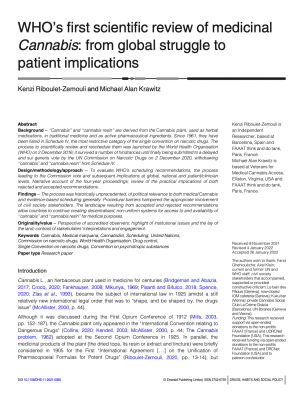Background – ‘‘Cannabis’’ and ‘‘cannabis resin’’ are derived from the Cannabis plant, used as herbal medications, in traditional medicine and as active pharmaceutical ingredients. Since 1961, they have been listed in Schedule IV, the most restrictive category of the single convention on narcotic drugs. The process to scientifically review and reschedule them was launched by the World Health Organisation (WHO) on 2 December 2016; it survived a number of hindrances until finally being submitted to a delayed and sui generis vote by the UN Commission on Narcotic Drugs on 2 December 2020, withdrawing ‘‘cannabis’’ and ‘‘cannabis resin’’ from Schedule IV.
Design/methodology/approach – To evaluate WHO’s scheduling recommendations, the process leading to the Commission vote and subsequent implications at global, national and patient/clinician levels. Narrative account of the four-year proceedings; review of the practical implications of both rejected and accepted recommendations.
Findings – The process was historically unprecedented, of political relevance to both medical Cannabis and evidence-based scheduling generally. Procedural barriers hampered the appropriate involvement of civil society stakeholders. The landscape resulting from accepted and rejected recommendations allow countries to continue creating decentralised, non-uniform systems for access to and availability of ‘‘cannabis’’ and ‘‘cannabis resin’’ for medical purposes.
Originality/value – Perspective of accredited observers; highlight of institutional issues and the lay of the land; contrast of stakeholders’ interpretations and engagement.

Authors

